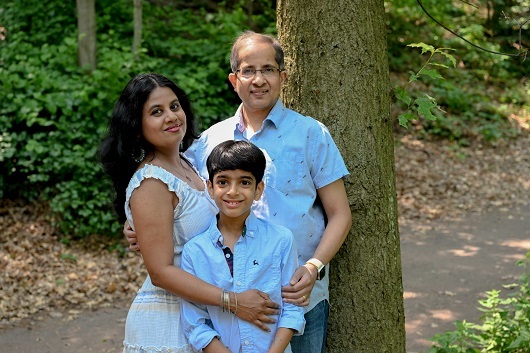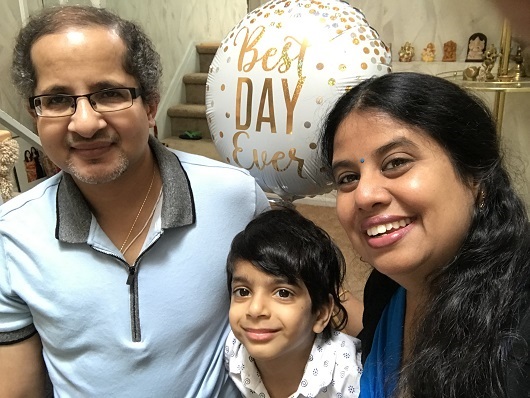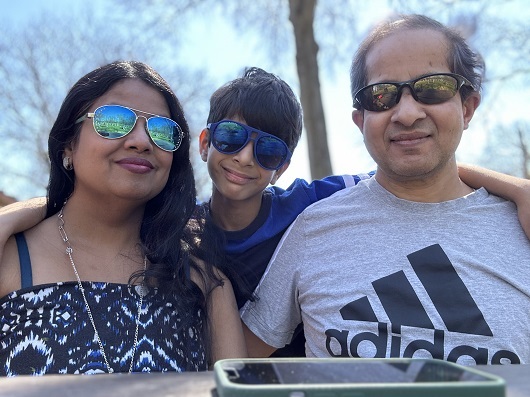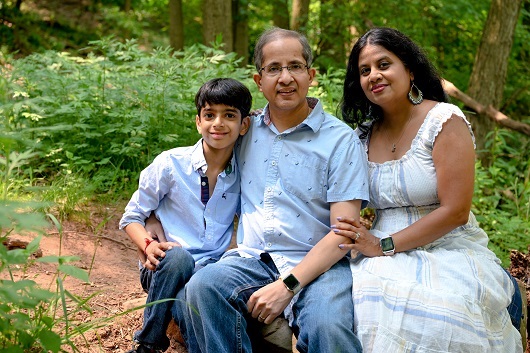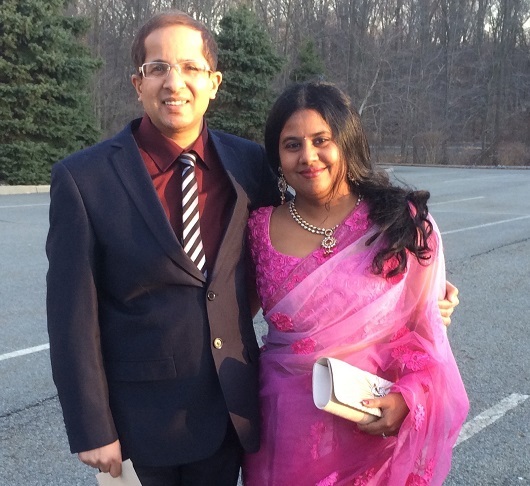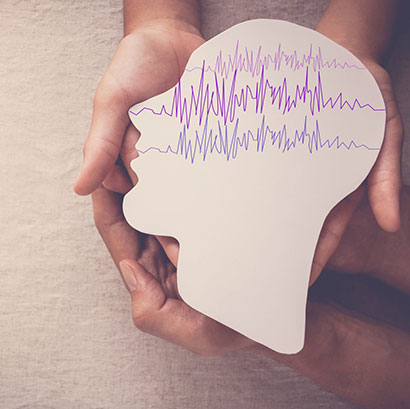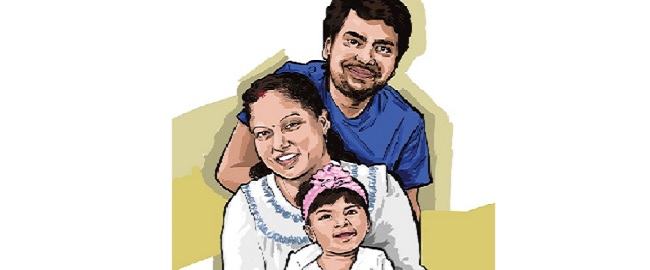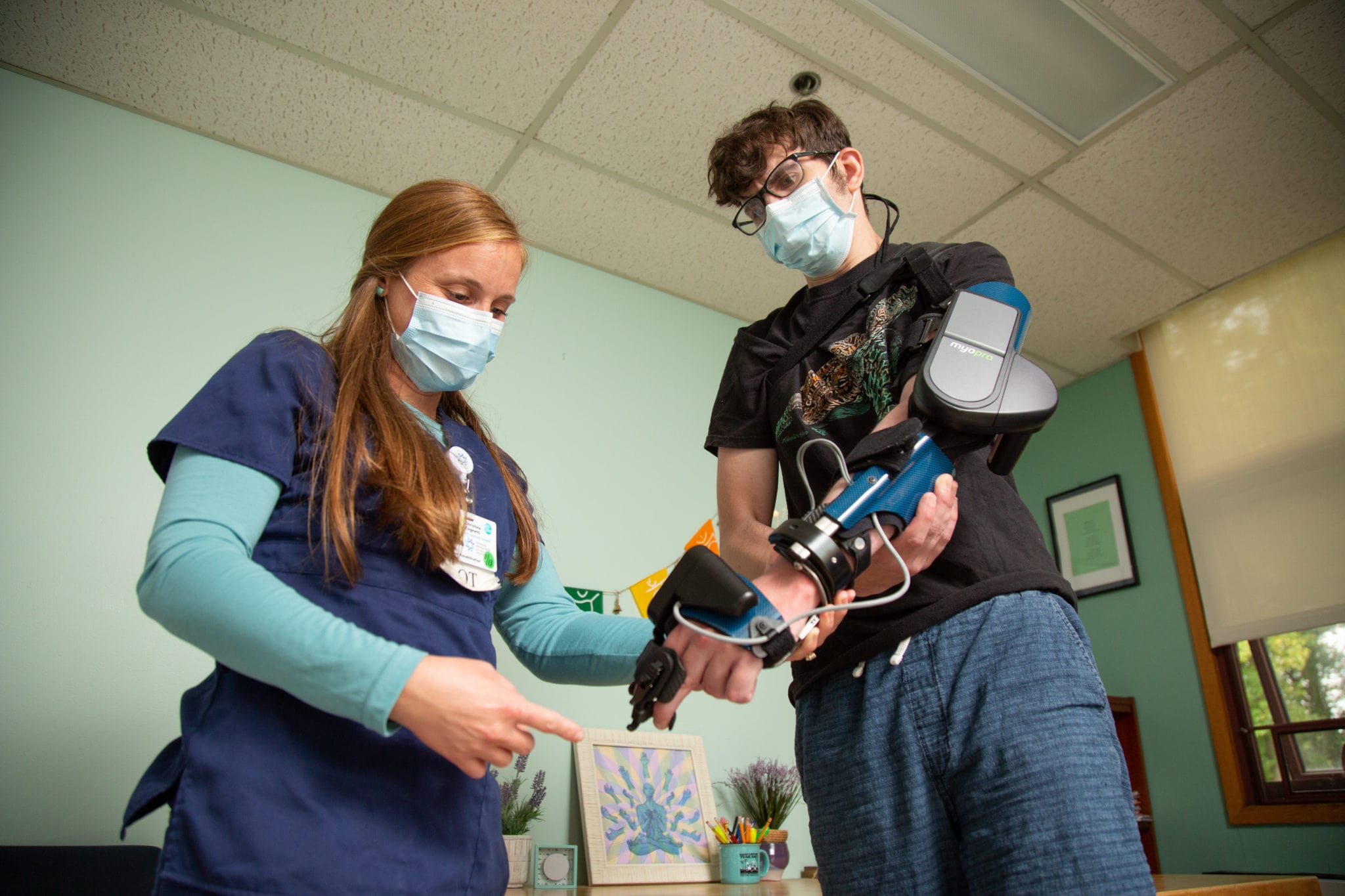Living Seizure-Free After Minimally Invasive Brain Surgery

July 05, 2023
For the past decade, Srinivas Rao, 52, had been having daily epileptic seizures that affected his quality of life — preventing him from working, driving, showering, using the stove or being left alone. But after an innovative minimally invasive epilepsy treatment at JFK University Medical Center in February 2023, Srinivas has so far remained seizure-free while taking two anti-seizure medications.
“I tried all types of medications to control my seizures, but none of them helped,” says Srinivas, who was on three anti-seizure medications at the time of his procedure. “Even when I wasn’t having seizures, I never felt completely normal. It was so hard on me and my family — especially my wife, an angel who has been on my side since the seizures started in 2013, and my son.”
Srinivas’ wife, Chitra — whom most people know as Sushma — says his seizures were so frequent and severe that the family lived with near-constant anxiety about when another seizure would occur.
“We literally had no idea what would happen in the next 30 minutes, so we couldn’t plan anything. We had to keep an eye on [Srinivas] all the time,” says Sushma. “Once, Srinivas fell during a seizure and needed to get nine stitches in his head.”
A Minimally Invasive Option for Epilepsy Treatment
With medications unable to control Srinivas’ seizures, his neurology team sent him to see fellowship-trained functional neurosurgeon Vanessa C. Milano, M.D. Dr. Milano, who joined the team at JFK University Medical Center in August 2022, specializes in minimally invasive neurosurgical treatments for epilepsy, movement disorders and brain tumors.
“Srinivas was having a specific type of seizure called a mesial temporal lobe seizure, and he was having multiple seizures every day despite taking three medications,” says Dr. Milano. “We know from research that adding a fourth seizure medication would have a very minimal chance of causing any significant reduction in Srinivas’ seizures and could result in additional side effects, so our next step was to discuss surgical treatment.”
One of Srinivas’ surgical treatment options was a procedure called a temporal lobectomy — an operation to remove the temporal lobe where the seizures were originating.
“This is a big operation that results in a large scar and a longer recovery time,” says Dr. Milano.
However, Dr. Milano was able to offer Srinivas a minimally invasive alternative to temporal lobectomy: A procedure called laser interstitial thermal therapy (LITT).
“LITT involves inserting a thin laser-tipped probe into the brain through a small incision and using it to heat up and destroy tissue in the part of the brain that is causing seizures,” says Dr. Milano, who noted that LITT can also be used to treat tumors deep within the brain that would previously be considered inoperable. “Patients who undergo LITT have a 55 percent chance of being seizure-free after the procedure, but some still require anti-seizure medication.”
Feeling Nervous, but Hopeful
After meeting with Dr. Milano and learning about the LITT procedure, Srinivas and Sushma were nervous — and hopeful.
Before Srinivas could proceed with LITT, he needed to have a procedure called a Wada test to make sure the LITT procedure would not affect the language and memory centers in his brain.
After Srinivas received the “all-clear” from his Wada test, Dr. Milano scheduled his LITT procedure — the first LITT procedure to be performed at JFK University Medical Center — for February 7, 2023.
On the day of surgery, Dr. Milano followed a detailed plan to target the precise area of Srinivas’ brain that was causing seizures while avoiding critical blood vessels. She performed the procedure using intraoperative MRI and real-time thermography technology, allowing her to constantly monitor the temperature inside Srinivas’ brain — ensuring that the laser was hot enough to destroy brain tissue, but not so hot that it damaged surrounding areas.
During Srinivas’ procedure, the team called Sushma — who was unable to be with Srinivas because she came down with COVID — every 45 minutes to provide updates on his condition.
“When I woke up after surgery, I wasn’t in any pain,” says Srinivas. “I had to spend one night in the hospital as a precaution, but I felt well enough to go home.”
Improved Quality of Life after Surgery
At his two-month follow-up appointment with Dr. Milano, Srinivas was seizure-free — although he is still unable to drive, work, or travel on airplanes due to the risk of experiencing another seizure. He has been able to stop one of his three anti-seizure medications, but he continues to experience medication side effects that include double vision and difficulty focusing his vision, balance issues and fatigue.
After watching everything that Srinivas has gone through during the past 10 years, Sushma and Srinivas’s son, now 8 years old, are thrilled that the procedure has improved his quality of life.
“Srini is always so concerned about caring for us. He deserves to be happy — and if he is happy, we are happy,” says Sushma. “Dr. Milano didn’t just save Srini — she saved all three of us.”
According to Dr. Milano, having access to LITT is a tremendous benefit to the community.
“When people hear ‘brain surgery,’ they tend to get scared,” says Dr. Milano. “Our goal is to make brain surgery — whether for epilepsy, brain tumors, movement disorders or other conditions — as minimally disruptive as possible, and we have the collaborative team and innovative technology in place to make that happen.”
“Dr. Milano came into my life and changed everything,” says Srinivas. “I got my quality of life back, and I’d do anything for [Dr. Milano] if she asked — she’s also an angel to me.”
Next Steps and Resources
- Meet our source: Vanessa C. Milano, M.D.
- To make an appointment with Dr. Milano or a neurosurgeon near you, call 800-822-8905 or visit our physician directory.
- Learn more about our neurosurgery program.
The material provided through HealthU is intended to be used as general information only and should not replace the advice of your physician. Always consult your physician for individual care.

